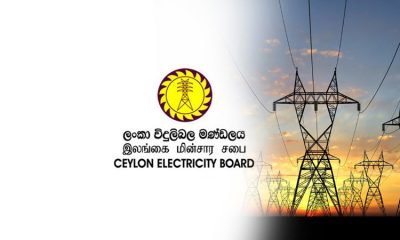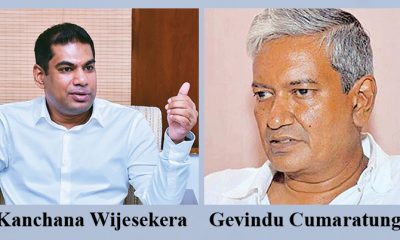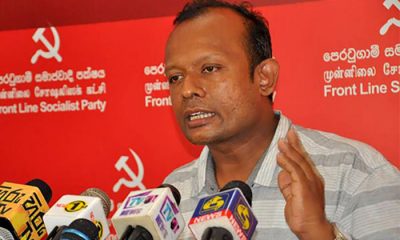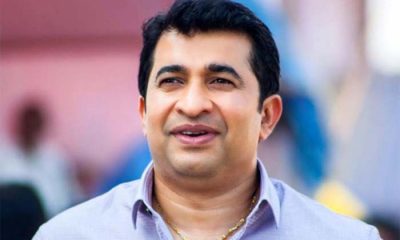News
Electrical engineer Ranawaka paints a grim picture of outcome of proposed CEB reforms

… likens it to what happened to Russia with Gorbachev reforms
By Saman Indrajith
Samagi Jana Balavegaya MP Patali Champika Ranawaka told Parliament yesterday that the government’s plans to restructure the Ceylon Electricity Board would certainly lead to disaster.
“These privatisation plans, if permitted, would have the same consequences as the economic reforms in Russia under Mikhail Gorbachev,” Ranawaka said.
Ranawaka, an electrical engineer, said that as per a recent Cabinet decision the CEB would be divided into 18 companies and some of its work would be given to four other companies. “This move will bring about disastrous consequences. And the privatisation of reservoirs will make it hard for the people to get water for drinking and agriculture because most water sources will be exploited by private companies in the name of power generation,” he said.
Ranawaka said that a committee report had been released on the plan to divide the CEB and its affiliated bodies into 18 companies and four institutions. The Cabinet had approved this report. The CEB would be broken down to 22 institutions. This will mean the dissolution of the CEB. Power generation would be given to six main companies. The first would take over the Kelani River hydropower generation including the Lakshapahana, Maussakelle, Canyon and Broadland. The second will take over the Mahaweli complex including Kotmale, Victoria, Randenigala and Polgolla. Third company would be set up at the Samanalawewa complex and CEB owned plants there. Fourth would be the Coal Power Complex of the Lakvijaya Power Plant in Puttalam, CEB’s Thermal Power plants at Kelanitissa and Sapugaskanda would be taken over by the fifth and the sixth would be the Wind power plant in Mannar, Ranawaka said.
Ranawaka said that people should not allow the privatisation of the waters of Kelani or Mahaweli rivers because that would deprive many provinces of drinking water. The top priority of the private companies would be the generation of power. What would happen if they cannot supply water to Colombo or any of these places?
“The most dangerous thing about this is the privatisation of hydropower. The public should not let this happen because we have finished paying for the Kelani River-based Laxapana Power Plant, and we have finished paying for the Mahaweli Power Plants. The government has no right to sell them. These are the people’s assets. Privatising these resources will be a serious threat to national security,” Ranawaka said, adding that the disbanding of the CEB is similar to Gorbachev dissolving Soviet Russia.
Ranawaka said that the issue of restructuring of the CEB would be taken up by the Economic Stabilisation Committee of Parliament under his watch and international experts had been invited to be present in the Committee on 13 Dec. He invited all MPs to attend the session and see the danger of the government move.
Power Minister Kanchana Wijesekera said that restructuring of the CEB had been accepted by all as a necessity. “This had to be done to increase efficiency. Without increasing efficiency it is impossible to control the electricity prices.”
Minister Wijesekera accused Ranawaka of misleading the House.
News
US sports envoys to Lanka to champion youth development

The U.S. Embassy in Colombo welcomed the U.S. Sports Envoys to Sri Lanka, former National Basketball Association (NBA) and Women’s National Basketball Association (WNBA) players Stephen Howard and Astou Ndiaye, from June 8 through 14.
The Public Diplomacy section of the U.S. Embassy said that it would launch a weeklong basketball program intended to harness the unifying power of sports, made possible through collaboration with Foundation of Goodness and IImpact Hoop Lab.
While in Sri Lanka, Howard and Ndiaye, both retired professional basketball players, will conduct a weeklong program, Hoops for Hope: Bridging Borders through Basketball. The Sports Envoys will lead basketball clinics and exhibition matches and engage in leadership sessions in Colombo and Southern Province for youth aged 14-18 from Northern, Uva, Eastern and Western Provinces, offering skills and leadership training both on and off the court. The U.S. Envoys will also share their expertise with the Sri Lanka Basketball Federation, national coaches, and players, furthering the development of basketball in the country. Beyond the clinics, they will collaborate with Sri Lankan schoolchildren to take part in a community service project in the Colombo area.
“We are so proud to welcome Stephen and Astou as our Sports Envoys to Sri Lanka, to build on the strong people-to-people connections between the United States and Sri Lanka,” said U.S. Ambassador Julie Chung. “The lessons that will be shared by our Sports Envoys – communication, teamwork, resilience, inclusion, and conflict resolution – are essential for leadership development, community building, equality, and peace. The U.S. Sports Envoy program is a testament to our belief that sports can be a powerful tool in promoting peace and unity.”
News
Rahuman questions sudden cancellation of leave of CEB employees

SJB Colombo District MP Mujibur Rahuman in parliament demanded to know from the government the reasons for CEB suspending the leave of all its employees until further notice from Thursday.
MP Rahuman said that the CEB has got an acting General Manager anew and the latter yesterday morning issued a circular suspending leave of all CEB employees with immediate effect until further notice.
“We demand that Minister Kanchana Wijesekera should explain this to the House. This circular was issued while this debate on the new Electricity Amendment Bill was pending. There are many who oppose this Bill. The Minister must tell parliament the reason for the urge to cancel the leave of CEB employees,” the MP said.However, Speaker Mahinda Yapa Abeywardena prevented Minister Wijesekera responding to the query and said that the matter raised by MP Rahuman was not relevant.
News
CIPM successfully concludes 8th Annual Symposium

The Chartered Institute of Personnel Management (CIPM) successfully concluded the 8th Annual CIPM Symposium, which took place on 31st May 2024. Themed “Nurturing the Human Element—Redefining HRM in a Rapidly Changing World,” the symposium underscored the pivotal role of human resource management (HRM) in today’s dynamic global landscape. Since its inception in 1959, CIPM has been dedicated to advancing the HR profession through education, professional development, and advocacy, solidifying its position as Sri Lanka’s leading professional body for HRM.
Ken Vijayakumar, the President of the CIPM, graced the occasion as the chief guest. The symposium commenced with the welcome address by the Chairperson, Prof. Arosha Adikaram, followed by the Web Launch of the Symposium Proceedings and Abstract Book by the CIPM President. The event featured distinguished addresses, including a speech by Chief Guest Ken Vijayakumar, President of CIPM, and an address by Guest of Honor Shakthi Ranatunga, Chief Operating Officer of MAS Holdings Pvt. Ltd., Sri Lanka.
The symposium also featured an inspiring keynote address by Prof. Mario Fernando, Professor of Management and Director of the Centre for Cross Cultural Management (CCCM) at the University of Wollongong, Australia.
Vote of Thanks of the inauguration session was delivered by Dr. Dillanjani Weeratunga, Symposium Co-chair.
The symposium served as a comprehensive platform for researchers to present their findings across a wide range of critical topics in HRM. These included Cultural Diversity and Inclusion, Talent Development and Retention, Ethical Leadership and Corporate Social Responsibility, Adapting to Technological Advancements, Mental Health and Well-being at Work, Global Workforce Challenges, Employee Empowerment, and Reskilling and Upskilling.
The plenary session was led by Prof. Wasantha Rajapakse. Certificates were awarded to the best paper presenters during the valedictory session, followed by a vote of thanks delivered by Kamani Perera, Manager of Research and Development.
The annual symposium of CIPM was a truly inclusive event, attracting a diverse audience that spanned undergraduates, graduates, working professionals, research scholars and lecturers. This widespread interest highlights the symposium’s significance in the field of HRM, offering a unique opportunity for everyone to network and learn from scholarly brains.The CIPM International Research Symposium was sponsored by Hambantota International Port, Sri Lanka Institute of Information Technology (SLIIT), E B Creasy & Co. PLC, and Print Xcel Company.






















